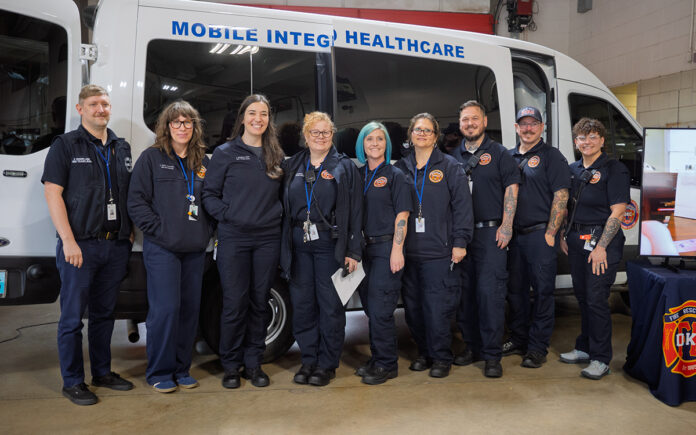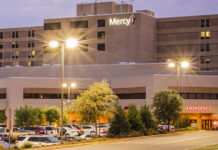Team provides an alternative response to residents experiencing mental or behavioral health challenges
City leaders and public safety officials launched the City of Oklahoma City’s Mobile Integrated Healthcare program during a public event at Oklahoma City Fire Department Station No. 1 located at 820 NW 5th Street.
Mobile Integrated Healthcare, a program of the Oklahoma City Fire Department, provides an alternative response to 911 calls involving behavioral and mental health needs. The program, developed in collaboration with the OKC Public Safety Partnership and the City’s Crisis Intervention Advisory Group, aims to divert emergency and non-emergency calls from a law enforcement response toward trained mental health and medical professionals who can best meet a person’s unique needs.
“Mobile Integrated Healthcare is reshaping public safety in Oklahoma City. When our residents call for assistance, our goal is to assure they receive a response that best meets their needs,” said Assistant City Manager Jason Ferbrache. “Prior to Mobile Integrated Healthcare, police, firefighters and paramedics have answered every kind of emergency call. By developing Mobile Integrated Healthcare, we’re increasing the capacity of first responders to assist with life safety emergencies while seeing to it that residents and visitors in mental health crisis can benefit from expertise of mental health professionals. When we send the appropriate team to calls, we create better outcomes for everyone in our community.”
Mobile Integrated Healthcare expands two programs OKCFD put in place to serve residents – the Overdose Response Team formed in 2023, and the Community Advocacy Program formed in 2019. The City began staffing Mobile Integrated Healthcare in 2024 with a 27-person team consisting of a program manager, clinicians, response navigators, paramedics and peer recovery support specialists. To create a fully mobile unit, the City purchased vehicles that are specially fitted to serve residents in mental health distress. The program currently operates from 7 a.m. to 11 p.m. seven days a week, with plans to extend operating hours in the future.
“We created Mobile Integrated Healthcare under the Fire Department to expand how we serve the community, making sure we meet the need of every kind of emergency, whether it’s a fire, a medical crisis or a behavioral health crisis,” said Oklahoma City Fire Chief Richard Kelley. “Mobile Integrated Healthcare specialists, working with a member of fire, EMSA or police, respond to people experiencing a behavioral health crisis in the field, making sure they get the help they need when they need it.”
Mobile Integrated Healthcare consists of four programs serving distinct crisis and alternative response functions. These programs include: a Crisis Call Diversion team embedded within the 911 Communications Center to triage, assess and respond to behavioral health- and mental health-related calls for service; a Crisis Response Team to respond to mental health emergencies in which an individual may be showing signs of being a risk to themselves or others; an Alternative Response Team that serves as both an overdose response team and a response team for less acute behavioral and mental health needs; and the Community Advocacy Program that provides support to residents who frequently rely on 911 services for non-emergency needs, connecting these individuals to community resources that can better serve them.
Mobile Integrated Healthcare is part of the OKC Public Safety Partnership, a collaboration among community stakeholders, city officials, elected leaders, law enforcement and residents to advance public safety for the Oklahoma City community.
Learn more about Mobile Integrated Healthcare: www.okc.gov/mih
Or contact Scott Douglas, Public Information Officer Oklahoma City Fire Department, (405) 316-6897, [email protected]















